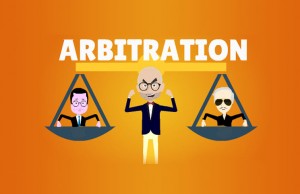In this blog post, Hitender Sharma, a member of the Bar of the District Court Mandi Town, Himachal Pradesh and currently pursuing a Diploma in Entrepreneurship Administration and Business Laws from NUJS, Kolkata, discusses the Appellate Arbitral Rules In international commercial arbitration.
What is Arbitration?
Disputes are inevitable in business. It is very difficult to visualize and negotiate perfect terms and conditions for any business relationship. In the event of dispute, parties to the business/contract approach a court. However, getting a resolution of the dispute through the court is a very difficult, cumbersome, time consuming and costly process and one has to wait for years to get final resolution of the dispute. This situation has resulted in the evolution of various alternative dispute resolution mechanisms for speedy resolution of disputes which helps parties to avoid costly and time-consuming litigations. Instead, parties can agree on a dispute resolution method by a written contract which is agreeable to both parties. Law has been enacted to give legitimacy to these private dispute settlement proceedings. There are various alternative dispute resolution options having the force of law to resolve disputes privately through arbitration, conciliation, negotiation and mediation. In most of business transactions and agreements, alternative dispute resolution clauses, specifically arbitration clauses, have become a common feature in India.
Arbitration is one of alternative dispute resolution mechanism used to resolve disputes between private entities, outside the Court. Even the Government resorts to this mechanism in their commercial transactions. The process of arbitration, however, can be resorted to only if there is a written arbitration agreement between the parties to the disputes or an arbitration clause in an agreement governing the commercial relations between the parties. The arbitration proceedings are governed by the Arbitration and Conciliation Act, 1996 (A&C Act) as amended from time to time. According to the provisions of A&C Act, arbitration can resort to only if there is a written arbitration agreement between the parties to the disputes or an arbitration clause in an agreement governing the commercial relations between the parties. The dispute is referred for adjudication to one or more persons referred to as arbitrator(s). The decision of the arbitrator called an arbitral award, is similar to the judgment of the Court and is legally enforceable in the same manner as if it were a decree of the court.
Types of arbitration
Arbitrations are of two types i.e. ad hoc or institutional.
Ad hoc arbitration
In an ad hoc arbitration, parties simply agree to the contract to resolve disputes by arbitration, without specifying any arbitral institution. Agreements/clause in the agreement only states that arbitration would resolve disputes regarding the Arbitration and Conciliation Act. The procedure for arbitration may be incorporated in the contract/arbitration agreement either at the time of entering into the contract or after a dispute has arisen. The parties are free to choose the arbitrators themselves. Sometimes, the number of the arbitrator(s) is specified. in an ad hoc arbitration, If they fail to agree upon an arbitrator, an appointing authority is required to make the appointment. In India, the Chief Justice of the High Court concerned, or the Chief Justice of the Supreme Court (if one of the parties is a foreigner) is the appointing authority.
Institutional arbitration
In an institutional arbitration, the parties choose the arbitral institution for conducting arbitration proceedings. Arbitral institutions have a panel of qualified and experienced arbitrators, may be having the expertise of Law or some commercial area relating to disputes. The arbitral institution provides arbitrator(s), basic infrastructure and a framework of administrative procedures for conducting arbitration proceedings. London Court of International Arbitration (LCIA), International Chambers of Commerce (ICC), Singapore International Arbitration Centre (SIAC) for conducting the arbitration, the Indian Council of Arbitration (ICA), the Indian Institute of Arbitration and Mediation (IIAM), and the International Centre for Alternate Dispute Resolution (ICADR) are arbitral institutions within and outside the country which conduct arbitration proceedings of the parties who choose them. These arbitral institutions have their rules and procedures for conducting arbitration proceedings to which parties to the dispute will have to abide by.
International Commercial Arbitration (ICA)
Section 2(1)(f) of the Act defines an international commercial arbitration as arbitration arising from a legal relationship , considered commercial and where either of the parties is a foreign national or resident or is a foreign body corporate or is a company, association or body of individuals whose central management or control is in foreign hands. Thus, under Indian law, an arbitration with a seat in India, but involving a foreign party will also be regarded as an international commercial arbitration, and hence subject to Part I of the Act. Where an international commercial arbitration is held outside India, Part I of the Act would not apply to the parties (save the stand-alone provisions introduced by the Arbitration and Conciliation Amendment Act, 2015 unless excluded by the parties) but the parties would be subject to Part II of the Act. The Amendment Act has deleted the words ‘a company’ from the purview of the definition thereby restricting the definition of international commercial arbitration only to the body of individuals or association. Therefore, if a company has its place of incorporation as India, then central management and control would be irrelevant as far as its determination of being an “international commercial arbitration” is concerned. The Supreme Court determined the scope of this section in the case of TDM Infrastructure Pvt. Ltd. v. UE Development India Pvt. Ltd., wherein, despite TDM Infrastructure Pvt. Ltd. having a foreign control, it was concluded that “a company incorporated in India can only have Indian nationality for the purpose of the Act.” Thus, though the Act recognizes companies controlled by foreign hands as a foreign body corporate, the Supreme Court has excluded its application to companies registered in India and having Indian nationality. Hence, in case a corporation has dual nationality, one based on foreign control and other based on registration in India, for the purpose of the Act, such corporation would not be regarded as a foreign corporation.
Appellate arbitral rules
The A&C Act, 1996 does not provide for an appeal against an arbitral award. The aggrieved party (who must be a party to the arbitration agreement or a party’s legal representative) may approach a court to set aside the award on any of the grounds mentioned in Section 34(2) of the A&C Act. However, these grounds offer very limited scope for review of the arbitral award as compared to an appeal in litigation in the court. In an appeal, a superior court goes into the merits of the decision of the lower court, while in the case of setting aside an arbitral award; the court is only required to check if the award violated specific requirements. It may examine the clauses of the agreement to determine the validity of the award.
Under Section 34 of the Act, a party can challenge the arbitral award on the following grounds:-
- the parties to the agreement are under some incapacity;
- the agreement is void
- the award contains decisions on matters beyond the scope of the arbitration agreement;
- the composition of the arbitral authority or the arbitral procedure was not in accordance with the arbitration agreement;
- the award has been set aside or suspended by a competent authority of the country in which it was made;
- arbitration under Indian law can not settle the subject matter of dispute;
- the enforcement of the award would be contrary to Indian public policy. The Amendment Act has added an explanation to Section 34 of the Act. In the explanation, public policy of India has been clarified to mean only if: (a) the making of the award was induced or affected by fraud or corruption or was in violation of Section 75 or 81, or (b) it is in contravention of the fundamental policy of Indian law; or (c) it is in contravention with the most basic notions of the morality or justice.
- A new section has been inserted in the amended Act providing that the award may be set aside if the court finds it vitiated by patent illegality which appears on the face of the award. For international commercial arbitrations seated in India, ‘patent illegality’ has been kept outside the purview of the arbitral challenge;
- In the amended A &C Act it is provided that an award will not be set aside by the court merely on an erroneous application of law or by re-appreciation of evidence. Further, a court will not review the merits of the dispute in deciding whether the award is in contravention of the fundamental policy of Indian law.
Section 34 also provides for the manner for the challenge of the arbitral award. The period for the challenge is before the expiry of 3 months from the date of receipt of the arbitral award (and a further period of 30 days is allowed on sufficient cause being shown for condonation of delay). If that period expires, the award holder can apply for execution of the arbitral award as a decree of the court. But as long as this period has not elapsed, enforcement is not possible. In the amended Act, a new sub-section (6) of Section 34 has been inserted which provide a period of one year for disposal of an application for setting aside an arbitral award.
Challenge to appointment of arbitrator
An arbitrator is expected to be independent and impartial.
If there are circumstances due to which his independence or impartiality can be challenged, he must disclose the circumstances before his appointment.
Appointment of an arbitrator can be challenged only if –
- Circumstances exist that give rise to justifiable doubts as to his independence or impartiality; or,
- He does not possess the qualifications agreed upon by the parties.
 Serato DJ Crack 2025Serato DJ PRO Crack
Serato DJ Crack 2025Serato DJ PRO Crack













 Allow notifications
Allow notifications


